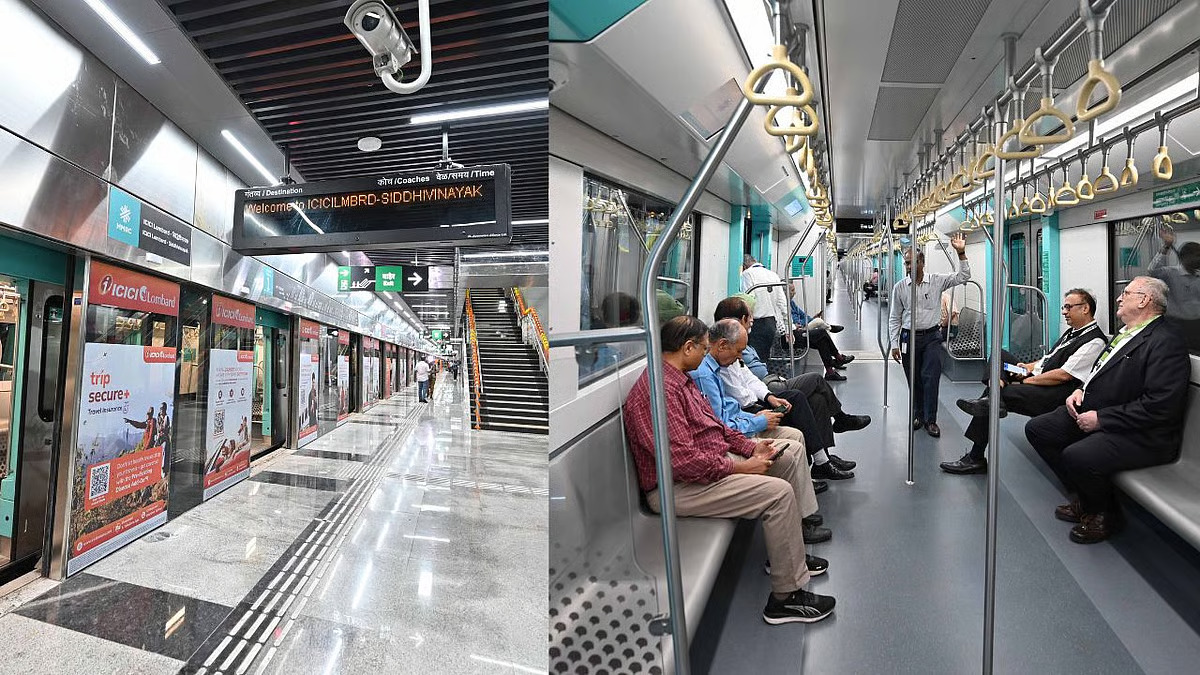Mumbai’s ambitious underground Metro Line 3, touted as the city’s modern lifeline and a state-of-the-art public transport system, has become a source of considerable frustration for thousands of daily commuters.
Passengers traversing the Aqua Line are routinely experiencing a complete blackout of mobile network services within the tunnels and stations. This critical lack of connectivity means no access to calls, internet, or essential digital payment systems like UPI, creating significant inconvenience and raising serious safety concerns, particularly in emergency situations. The unfolding situation highlights a crucial gap in the city’s promise of a truly world-class, connected urban transit infrastructure. Akhil Anil Chitre, President of Shiv Sena (Uddhav Balasaheb Thackeray)’s IT, Electronics and Communication Wing, has formally escalated this pressing issue by penning a sharply worded letter to the Managing Director of Mumbai Metro Rail Corporation Limited (MMRCL). Chitre’s letter directly challenges the Metro administration, questioning the extent to which the patience of Mumbaikars will be tested by this persistent connectivity void. The core of the accusation within the letter alleges that the monopoly for mobile network infrastructure has been unfairly granted to a single private contractor, effectively sidelining other major telecom companies from operating within the metro system. This alleged exclusive arrangement, it argues, is directly impacting the common passenger, who is bearing the brunt of this restrictive policy.
The primary demands articulated in the letter are clear and resonate deeply with public sentiment. First and foremost, it calls for the immediate restoration of mobile network service across all metro stations and tunnels, ensuring seamless communication for commuters. Secondly, it demands transparent information from MMRCL regarding the status of ongoing talks with various telecom operators, providing the public with clarity on when a comprehensive solution might be expected. Lastly, the letter insists on a formal apology to passengers for the inconvenience caused, coupled with firm assurances that such a service disruption will not recur in the future. Chitre’s warning is unequivocal: “The city of Mumbai runs on trust and accountability. If this trust is broken, then Mumbai knows how to raise its voice.” This powerful statement underscores the deep-seated public reliance on efficient and reliable public services, especially in a metropolis like Mumbai where connectivity is paramount for both daily life and emergency preparedness. The escalating resentment among passengers is now placing significant pressure on MMRCL to expedite a resolution to this critical problem. The civic body is being urged to fulfil its initial promise of delivering a truly “world-class” metro experience, which inherently includes reliable mobile connectivity.
The current situation on Metro Line 3 stands in stark contrast to the vision of smart and connected urban infrastructure. In an era where digital payments and constant communication are integral to daily life, a public transport system that fails to provide basic mobile network access creates a significant operational deficit. This not only hampers convenience but also poses potential risks, as highlighted by the inability to contact emergency services or family members during unforeseen circumstances. The incident prompts a broader discussion on the necessity of comprehensive digital infrastructure planning in large-scale urban projects, ensuring that the promise of modernity translates into tangible benefits for all citizens. The onus is now squarely on MMRCL to demonstrate responsiveness and a commitment to public service. A swift and transparent resolution, involving a fair and competitive engagement with all major telecom providers, would not only restore passenger confidence but also uphold the reputation of Mumbai’s ambitious metro project. Failure to address this fundamental issue promptly risks eroding public trust in a system that was once heralded as the future of urban mobility in the financial capital. The demand for seamless connectivity on Metro Line 3 is not a luxury but a fundamental expectation in today’s digitally driven world.
Also Read: Delhi Metro Runs Early for UPSC Candidates


